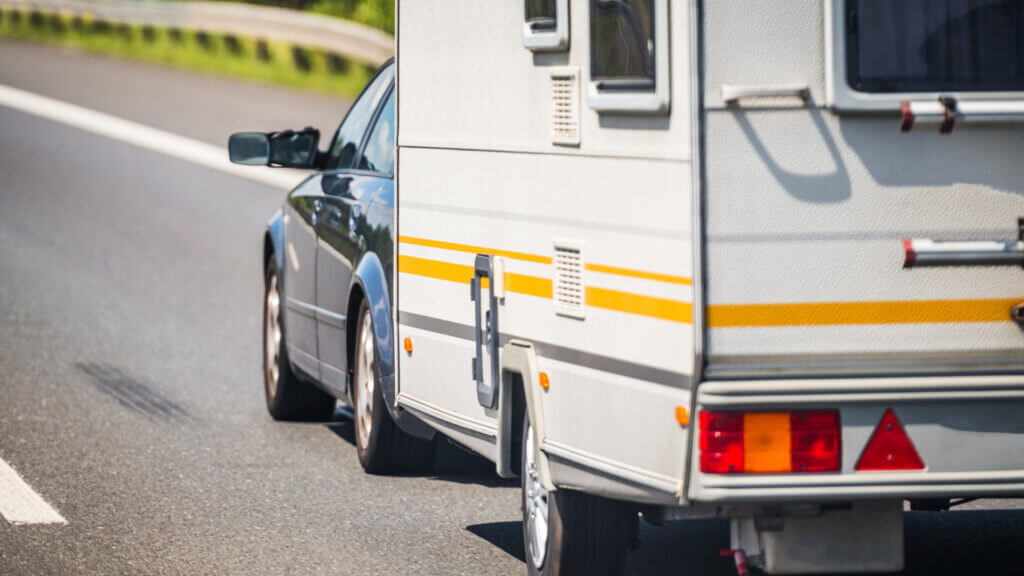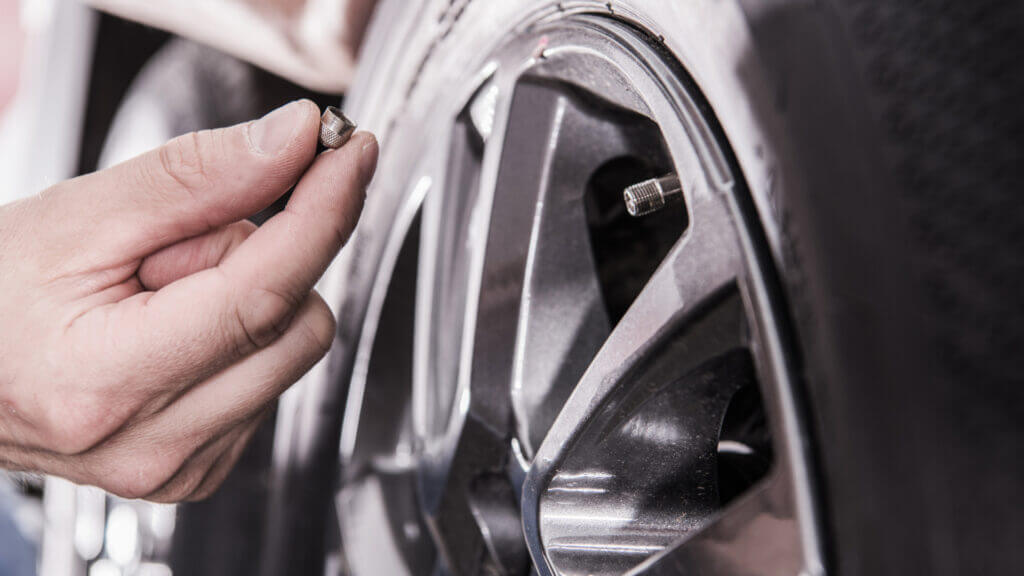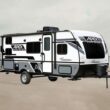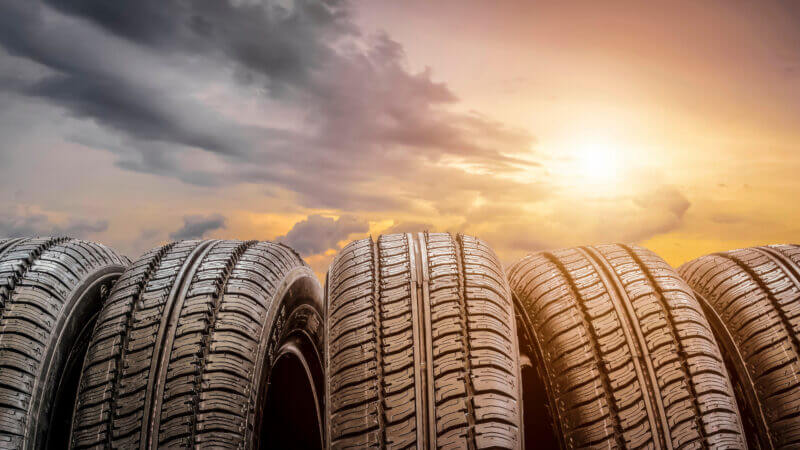Table of Contents Show
If you want the best experience in your camper, maintaining your trailer tires is vital. You might think this is the simplest maintenance item for your trailer, but tires, while seeming innocuous, are anything but simple.
What Is a Trailer Tire?
Not everything round, rubber, and attached to a hub is considered a trailer tire. Car tires, truck tires, and trailer tires may look similar at first glance, but there are a few critical differences, and you can’t use them interchangeably.
Vehicle tires pull the car or truck forward, so they need more traction. The tread will be wider and patterned differently to bear the responsibility of accelerating, turning, and braking.
Trailer tires are made to be pulled, so the tread will be more narrow and leans to the middle to help with load-bearing. They’re designed to hold more weight on the sidewalls during long hauls.
There are also different codes to designate car and trailer tires. Tires with a P in the code are passenger car tires, LT are light truck tires (probably what is on your tow vehicle), and ST are “special trailer” tires.
There are also numbers behind these letters to designate the size of the tire. Your trailer’s manufacturer manual should designate the kind of tires you’ll need.

Radial vs. Bias Ply Tires
In your search, you’ll likely come across the terms radial and bias ply tires. Here’s a closer look at the differences between them.
A radial tire is made by overlapping polyester cords at a 90-degree angle from the center of the tire. They are better for sway control and offer a smoother, quieter ride. They also tend to run cooler, have better fuel economy, and feature a wider footprint to spread outwear.
Bias tires are less expensive than radial tires, and they do fine going straight, but they don’t corner as well. They’re made with diagonal layers at 45-degree angles to the center of the tire.
While bias ply tires may be sufficient for some local usage (say farm trailers), they typically don’t work as well for a camper or RV situation where you tow at highway speeds and want to go farther from home.
Most RVers consider radial tires the superior option. They may be more expensive than bias tires, but the comfort and handling are much better. They also preserve your fuel economy, helping to offset the initial cost of the tires.
Benefits of Trailer Tires
There are many benefits of trailer tires, including their ability to hold more weight than typical vehicle tires. Also, they’re also made with stronger sidewalls and can corner easier while in tow.
Also, the tread patterns on trailer tires are not made to grip the ground, but to be pulled, which is better for the ride of the trailer and should be better on gas mileage due to less resistance.
You don’t want to put LT or P vehicle tires on a trailer, but ST trailer tires are made specifically for travel trailers. And while they may be more expensive, they’re designed for towing.
Quick Tip: To learn even more about RV tires, check out our Ultimate RV Tires Buyers Guide!
Picking The Best Trailer Tires is Dependent On Your Trailer
Not all of these tires are the same. Besides size, consider clearance under the wheel well, the trailer’s weighter, and your towing tendencies. For example, if you only pull your trailer 50 mph for 10 miles to and from a local state park, you might be ok on a less heavy-duty tire.
However, suppose you routinely haul your trailer at 65 mph or more. In that case, it’s a heavy trailer, or you’re going on freeways, bumpy roads, and hauling every weekend for multiple hour treks, it makes sense to upgrade your tires to a heavier weight rating and higher speed rating.
Things to Consider When Choosing the Best Trailer Tires
There are a few considerations to look at when selecting a tire.
Load Carrying Capacity and GVWR
First, you will need to find the weight of your trailer. Because not all tires are equal, and you don’t want to skimp on load rating. A tire that’s too heavy will ride rough, while a tire that’s too soft will put pressure on the sidewall and lead to a blowout or poor wear on the tires.
Load Rating and PSI
There are also load ratings on the tire (letters B, C, D, E), which will give you information on how much weight the tire can carry. Most travel trailer tires will be labeled D or E, which means they can carry 1,220 pounds at 65 psi or 1,520 pounds at 80psi. PSI stands for pounds per square inch and indicates your tire’s inflation pressure.
Consider Tire Speed Ratings
How fast do you tow? You shouldn’t pull most trailers with standard tires over 65mph. There are a couple of brands now that have higher speed ratings, however.
While we don’t suggest going at regular highway speeds while towing, having a higher speed rating on your trailer tires is necessary if you’re a person that often pulls over 65mph. It’s also important if you’re traveling where highways are 80 mph, or you tend to have a lead foot.
All Trailer Tires Should Be The Same
Do not mix tire types or brands on your trailer. Some folks try to replace a damaged tire with any trailer tire, or they might mix and match brands, ages, sizes, or treads. This doesn’t allow the tires to wear the same and can cause more issues.

How Long Do Trailer Tires Last?
Unlike car tires, trailer tires typically don’t lose tread, so using the coin trick or a depth measurement isn’t a great way to judge their life.
Most trailer tires begin to degrade based on the rubber disintegrating well before any tread wear is visible. The heat from towing, sitting in one spot for periods, underinflation, and sun exposure are the worst things for trailer tires.
Sun and weather dry rot the tires’ sidewalls and even hairline cracks can be dangerous for blowouts. Check the date of manufacture on the tire sidewall. It will have a two-digit year and a two-digit week (for example, 1945 would be the 45th week of 2019). That will tell you the date the tire was made. If you don’t see the code, look on the inside of the tire. Tires will typically safely last 5-6 years at most.
Parking the trailer in the shade, covering the tires, moving the trailer at least monthly, and never underinflating the tires are all ways to keep the tires in good shape as long as possible.
When Should Trailer Tires Be Replaced?
You should replace your trailer tires if there’s any sign of damage or dry rot cracks on the sidewall. Even tiny hairline cracks will be a weakness that might not hold up to travel. Bulges or uneven wear can signify impending problems and may show that your axle is bent.
Additionally, replace your tires if they’re over five years old. If you’re concerned about the condition, have them inspected and consider replacing them. Don’t forget to look at your spare and to keep it in working order as well!
Damage to your camper during a blowout and a potential wreck is not worth trying to squeeze one more trip or one more season out of your tires.
Trailer tires are not sexy purchases, and they aren’t cheap. But you want to avoid having trailer drama or a wreck on your next trip. Upgrading or buying new tires can give you peace of mind and save you from thousands of dollars in damage, an accident, or a long delay in your camping adventures.







Followed a buddy who was moving a newly purchased used boat and trailer several hundred miles to his home. A trailer tire blew just west of Junction TX on I-10. The resultant flapping tread blew the fender off, destroyed the lighting and wiring and caused a spectacular trailer sway. As he was traveling at a reasonable speed, no damage to the boat occurred. We had already determined the spare tire was worthless. Being a Sunday, nothing was open to acquire a replacement.
A passing motorist stopped, assessed the issue and loaned his spare off his RV. Fortunately he lived just 100 miles from my buddy so we were able to return the spare along with a smoked brisket in a timely fashion.
Lesson learned: when purchasing a used trailer, assume the tires are defective and replace prior to travel.
Good read. Tires are easy to forget about until there is a problem.
Jason,
Different subject, I have an A1A Tireminder that I want to install on our
Reflecton 337 RLS I am looking for a place to permanitly mount the booster box and where to make the positive- negative connection. I would also like it to not draw current from the battery when the battery disconnect switch is off.
we have own ourT@b400 for about 3 yrs now and are part-timers in RV – though we have taken out “Shadow” for 5 weeks at one summer trip and when we do go out – typically 3 weeks average if not just the weekend locally. we live in HB CA so you know there’s the sun factor and recently bought a cover for the trailer. have purchase tire covers but never put them on now. Shadow is parked along a low brick wall and we tend to have another car parked alongside too.
so not direct sunlight but some exposure, planning an extended summer and spring trip this year in April and June and Sept! so hubby thinking of replacing the tires .